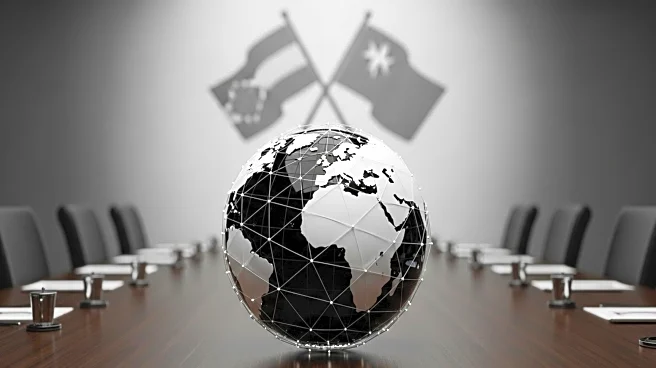What's Happening?
Chinese President Xi Jinping is hosting a summit in Tianjin, China, with leaders including Russian President Vladimir Putin and Indian Prime Minister Narendra Modi. The summit, part of the Shanghai Cooperation Organization, focuses on geopolitical issues, particularly the impact of U.S. President Donald Trump's trade policies. Trump has imposed significant tariffs on Indian goods due to India's continued purchase of Russian oil, while Putin faces new Western sanctions related to the Ukraine conflict. The summit aims to strengthen ties among member states and address challenges posed by U.S. foreign policy.
Why It's Important?
The summit underscores the shifting geopolitical landscape, with China positioning itself as a leader in a multipolar world order. The gathering of heavily sanctioned countries, including North Korea and Iran, highlights the potential for these nations to collaborate against Western economic pressures. The summit's focus on U.S. trade policies reflects broader tensions in international relations, with China and Russia seeking to counterbalance U.S. influence. This development could affect global trade dynamics and diplomatic relations, particularly for countries like India, which are navigating complex relationships with both the U.S. and China.
What's Next?
The summit may lead to increased cooperation among member states, potentially challenging U.S. economic and diplomatic influence. The discussions could result in strategic partnerships that reshape global alliances, particularly in the context of ongoing trade tensions. The outcomes of the summit may influence future interactions between the U.S. and countries like China and Russia, impacting international trade and diplomatic relations.
Beyond the Headlines
The summit reflects broader geopolitical shifts, with China leveraging its role in the Shanghai Cooperation Organization to enhance its global influence. The focus on trade and economic cooperation highlights the potential for long-term strategic partnerships that could challenge Western dominance. The inclusion of countries facing sanctions raises ethical and diplomatic questions about the organization's role in international relations.











